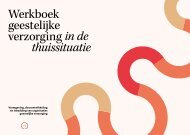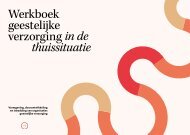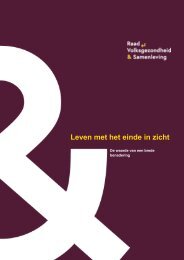Buiten kerk en moskee
Religie in een pluriforme samenleving. Diversiteit en verandering in beeld.
Religie in een pluriforme samenleving. Diversiteit en verandering in beeld.
You also want an ePaper? Increase the reach of your titles
YUMPU automatically turns print PDFs into web optimized ePapers that Google loves.
Summary<br />
Religion in a pluralistic society<br />
A focus on diversity and change<br />
Part 3: Beyond church and mosque<br />
A closer examination of the ideological world of non-followers of (traditional) religions and<br />
modern-day spirituals<br />
This report is the third and concluding part of a series on religion and ideology, in which the<br />
c<strong>en</strong>tral focus is on alternative spirituality, meaningfulness and Dutch citiz<strong>en</strong>s who profess<br />
not to follow a (traditional) religion. What is meaningfulness and how might we be able to<br />
measure it? Who derives a lot of meaning from life, and who does not? How many modern-day<br />
spirituals, atheists and agnostics are there in the Netherlands? How does this compare<br />
with the size of these groups in other (European) countries? Are they clearly distinguishable<br />
from each other, or are there also correspond<strong>en</strong>ces? What is their relationship to<br />
religious groups in the Netherlands? And how do these modern-day spirituals and religious<br />
‘nones’ stand on the great ideological questions, which do not only play a role in the lives<br />
of those who follow (traditional) religions. These are the c<strong>en</strong>tral research questions<br />
addressed in this study, with extra att<strong>en</strong>tion for modern-day spirituals and religious<br />
‘nones’ (i.e. self-id<strong>en</strong>tified atheists and agnostics), giv<strong>en</strong> that these two groups, after Muslims<br />
and Christians in the first and second parts, respectively, of this trilogy of ideological<br />
studies, are the main focus in this concluding part.<br />
The Netherlands is secularising rapidly, including in a European perspective<br />
Based on international research, the conclusion in chapter 2 of this report is that the Netherlands<br />
has secularised extremely rapidly in rec<strong>en</strong>t years, including wh<strong>en</strong> compared with<br />
other countries, and, together with the Scandinavian countries and the Czech Republic, is<br />
now among the most secular countries in Europe. This sharp decline in traditional (Christian)<br />
religious affiliation is offset only partially by a (small) increase in modern-day spirituality,<br />
with curr<strong>en</strong>t indications suggesting that this may be a temporary ph<strong>en</strong>om<strong>en</strong>on that is<br />
already in decline. ‘Beyond church and mosque’, th<strong>en</strong>, there has be<strong>en</strong> an especially sharp<br />
rise in the number of agnostics and atheists in the Netherlands, especially in rec<strong>en</strong>t years.<br />
Spiritual affiliation in the Netherlands is not especially high compared with other European<br />
countries, with only around one in sev<strong>en</strong> Dutch people believing in various aspects of<br />
modern-day spirituality. That compares with two in five in the Czech Republic and Slovakia,<br />
for example, although a relatively high proportion of Dutch people do (curr<strong>en</strong>tly) still<br />
describe themselves as unaffiliated (modern-day) spirituals. At first sight, the decline in<br />
(traditional Christian) religion might seem to have made it more difficult for people in the<br />
Netherlands and elsewhere to derive meaning from their lives. On the other hand, people<br />
167 s u m m a r y










